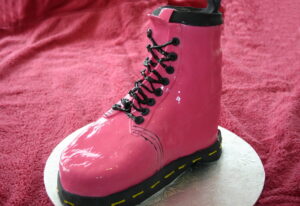These cookies were made on the occasion of JB’s (I never did find out his actual name) bar mitzvah. Not a lot of commentary is necessary for these. But what can you say when you have nothing to say?
I’ll let Julie Andrews and Dick Van Dyke take it from here.
I actually thought this word was the brainchild of P. L. Travers, the author of Mary Poppins. However, Merriam-Webster set me straight.
For many people, supercalifragilisticexpialidocious and the 1964 movie Mary Poppins are inextricably linked. Indeed, it was this movie that popularized the word. The songwriters, brothers Richard and Robert Sherman, have explained the word as originating in the same way they, like many others, used to make up humorously big, nonsensical words as children:
“Remember when we used to make up the big double-talk words, we could make a big obnoxious word up for the kids and that’s where it started. “Obnoxious” is an ugly word so we said “atrocious,” that’s very British. We started with “atrocious” and then you can sound smart and be precocious. We had “precocious” and “atrocious” and we wanted something super colossal and that’s corny, so we took “super” and did double-talk to get “califragilistic” which means nothing, it just came out that way.”
Coincidentally, there was also a song called Supercalafajalistickespeealadojus that was written in 1949, and the authors of the song brought a suit against the Sherman brothers for copyright infringement. In the end, the court decided in the Shermans’ favor because, among other things, affidavits were produced that claimed that variants of the word were known many years prior to 1949, making the plaintiffs’ claim unfounded.
The word supercalifragilisticexpialidocious in Mary Poppins is said to be simply a word used as “something to say when you have nothing to say.”
Finally, what of the claim made in Mary Poppins that saying the word loud enough will cause the speaker to sound precocious? We do not have sufficient evidence to support that conclusion at this time.








